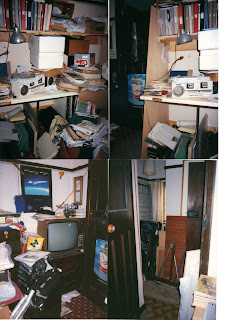
- Be left with degenerative COVID-19 related physical health problems that affect them for the rest of their lives
- End up with PTSD caused by the trauma of having had COVID-19, as well as having to adjust to having physical anxiety, depression or stress-related illness that they may not have had before
- Find it difficult to maintain their pre-COVID-19 career/employment status, level of income and lifestyle
- End up finding themselves reliant on the benefits system to be able to pay their bills - assuming there is an appropriate welfare system in place where they live of course...
- Need to downsize or request council accommodation if their situation becomes too dire (they may even have to relocate to other areas if there's insufficient suitable accommodation available in their area.
- Lose some of their Executive Functioning (EF) - the daily skills of life that enable us to carry out what "neurotypicals" take for granted, such as:
- the ability to remember were they put things;
- arrive at appointments on time (assuming they remembered to write the appointment in their diary in the first place - assuming they could even find their diary or remembered to look in their diary);
- organise their homes (eg. create and maintain effective filing systems for paperwork, photos, emails, etc;
- manage their affairs (eg. pay bills on time, arrange repairs to be carried out to fix broken heating, etc)
- maintain a clean, safe, hygienic and clutter-free living environment
- Very rarely lifestyle choices
- Until COVID-19, the chances are that that individuals experiencing these issues had underlying neurological and/or mental health conditions (often undiagnosed). Post-COVID-19, the difficulties could be related to that issues caused by the Coronavirus, on top of existing problems.
- Likely to be physical representations of the chaos and overwhelm in a person's life
- Often made worse by sending in a clearance/cleaning firm, instead of someone who offers a person-centred service
- there may be no money to pay for these essential services
There aren't enough of us with sufficient skills and experience of working with people with complex needs to meet demand. And those of us who do have been inundated with calls since lockdown started - we simply can't keep up (so apologies to all those who we've not yet had a chance to contact).
- inadequate budgeting and training of NHS and local authority personnel to provide specialist person-centred practical support
- Many people who lose their job due to the deterioration in their health, and who turn to already over-stretched health and social care and/or benefits systems to pay for support
- enormous competition for already very limited health and social care budgets
- an increase in demand for council accommodation
- an increase in the number of social workers required to deal with increased case-loads
- an increase in safety issues in the home due to self-neglect, fires; slips, trips and falls; infestations, etc.
- an increase in the number of vulnerable people being targeted by unscrupulous scammers and and becoming victims of of cuckooing (when people are unwell they are less able to maintain their properties in which drug dealers take over the home of a vulnerable person in order to use it as a base for county lines drug trafficking.
All of which could continue for many years to come.
Still, it's reassuring to know that decluttering and organising specialists are likely to at last become an integral part of multi-agency responses and interventions. Better late than never.
My hope is that by re-training people who have struggled with organising issues the past - and either attended hoarding or clutter support groups or worked with professional practitioners (or both) to develop sustainable coping strategies that brings order to their lives - we'll end up with a new generation of practitioners as passionate as we are about giving something back to clients who were once like them.
So, if you'd like to know more about attending training to become a Professional Hoarding Practitioner, please please please get in touch.
Because without your empathy, patience, and ability to motivate, empower and coach people to believe in their ability to take control of their paperwork and their homes, some people won't be able to sort their way out of their mess - which wasn't their fault in the first place....
+++++
To find a Professional Organiser in the UK, check out The Association of Professional Declutterers & Organisers (APDO) website - www.apdo.co.uk










